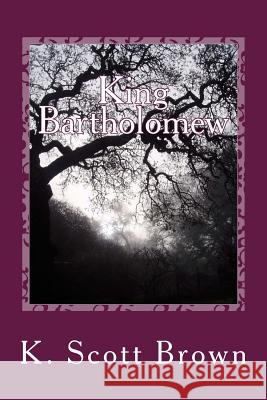King Bartholomew: Tales from the Isle of Man » książka
King Bartholomew: Tales from the Isle of Man
ISBN-13: 9780615628165 / Angielski / Miękka / 2012 / 362 str.
Prince Bartholomew sits in a comfortable chair inside the west tower beneath an open window and dreams as the pipe slowly slips from his hand and falls to the floor smoldering. The Prince is a dreamer; he has always been a dreamer, and as a King he will continue to dream. The Prince was conceived in a magic garden, built by his father, King Sigmus, and presented to his lovely mother, Queen Kathryn. The magic garden was a gift, and it was built with love. And so it is that the languid Prince can be forgiven for his flights of fancy because he lives on an enchanted island. The stories in this episodic novel follow Bartholomew through a life richly dreamed and focus on some of the events which, like jewels in a crown, shine brightly and give purpose to the life, and to the Crown. Bartholomew learns about fate from the chance sighting of a comet and a horse with a mangy mane. He learns about patience during an ordeal with a stubborn tree stump and a stone. He learns about friendship from the loss of a friend and he learns about serving by being served. He learns about stories by listening to stories and from telling stories. He learns about respect by the folly of his own disrespect. Finally, he learns about death from watching the death of those whom he loves. But the King is not merely an observer for he too has magic-the magic to touch the hearts of his people and the power to impress which reaches beyond the boundaries of his own tiny life. Throughout King Bartholomew are stories derived from the lavish folklore of the Manx. This folklore is based on the wonderful superstitions formed around ancient druidic lore, Celtic lore, early Christian iconography, angelic knowledge, esoteric knowledge, forgotten lore, sea monsters, spirits, demons and other forms of supernaturalism. Ritual magic and the belief in pagan animism shaped this folklore and filled it with breath. Often written in parabolic form, many of these stories resemble folktales and fairytales of old; and like these beloved fairytales, often there are lessons to be learned. Far removed from the world of science and technology and mathematical certainty, imagine a world steeped in the power of the unknown and the wisdom of the past. Ancient songs and prayers uncover the musical echoes of words remembered and as we peer across the shimmering Crossag Bridge we sense the fragility of a sovereign King lost in strange epiphanies. In simpler times the world was not understood to be round, but it was the beauty of such agreeable people to create sea monsters with which to do battle when their life became too bitter from work and worry. In simpler times, the people were surrounded by vast, untamed forests and wild fiends lurching from dark shadows. In such times the world was thought to be flat, for the earth did not move-the stars moved. Belief in sympathetic magic made the world a terrifying place. The people gathered together in villages for protection and they prayed that the power of Christ be stronger than the beasts and demons that haunted their dreams. Imagine a world still enchanted with sorcery and witchcraft, of talking fish and sliding, slithering herring, of whispered words and rising miasmas. And though we no longer live in such a world, to imagine is to believe.











